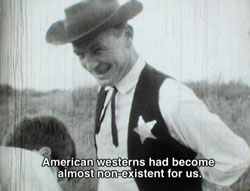Soukromé stoleti: Sejdeme se v Denveru (Privates Jahrhundert: Wir treffen uns in Denver) (2006/07)

Inhalt - Synopsis
Soukrome stoleti: Sejdeme se v Denveru (Privates Jahrhundert: Wir treffen uns in Denver)
Kompilation aus privaten Amateurfilmen. Erzählt wird das Schicksal der Familie Čvančara von 1920 bis 1970. František wird im prager Stadtteil Žižkov geboren. Sein Vater gründet einen Filmverleih und betreibt einige Kinos in Prag. Františeks Leben ist geprägt von amerikanischen Grotesken und Wildwestfilmen. Eine dieser Serien endet immer mit dem Satz »Wir treffen uns in Denver«, der für František und seine Freunde zu einem geflügelten Wort wird. Nach dem Zweiten Weltkrieg und der Machtergreifung der Kommunisten verliert der Vater sein Gewerbe, und die Western verschwinden von der Leinwand. Zusammen mit seinen Freunden dreht František nun seine eigenen Western. Nach dem Scheitern des Prager Frühlings entschließt er sich, mit seiner Familie nach Kanada zu emigrieren. Als auch sein Cousin und Westernfan Ferdinand in die USA auswandert, reisen sie gemeinsam an die Orte aus den Filmen ihrer Jugend.
A compilation of private amateur films. It’s the story of the Čvančara family between 1920-1970. František is born in the Žižkov district of Prague. His father establishes a film distribution company and runs several cinemas in
Zeitgenössische Kritiken:
Heedlessly posing against an invisibly crumbling landscape, the subject creators of Private Century's 52-minute episodes are all displaced – whether by the Russian Revolution, World War II or the 1948 Communist coup. Although these people represent only a small part of the Czech population, namely those with the urge to document their lives and a 16mm camera with which to do so, their circumstances vary – newly wealthy and newly impoverished, urban and rural, capitalist and communist, bourgeois and small-B bohemian.
Sikl's archives share the universal concerns of home-movie making – people at play, on vacation, visiting the circus or dancing in their swimsuits; childhood idylls that may conceal personal unhappiness. For Sikl, home movies are not so much folk art as unofficial history, less alienated nostalgia for a lost past than a sort of petrified innocence enjoyed before the fall. The naïveté is not aesthetic, but political.
Do we look at these movies or through them? Annotated by bits of music and the voice-over narrations of surviving family members, Private Century raises two ontological questions: Who shot the original footage, and what principles guided Sikl in reshaping it?
Jim Hoberman: In Private Century and A Lust For Ecstasy. Home Video as Cinema
Village Voice, 11.3.2009
Czech filmmaker Jan Sikl’s Private Century can be read both as formal experiment and as social history. Made from home movies created by residents of Czechoslovakia during, primarily, the ‘20s through the ‘60s, his eight film series is an exercise in editing and narrative that also serves to document life in Czechoslovakia from the perspective of individuals and families, perspective provided not merely from the collected home footage but also from narration scripted from interviews with relatives from the families represented in the films. [...]
One of the minor notes in Private Century is the power of cinema. The families featured in the series are clearly fascinated by the medium of film. Many of the shots incorporated into Sikl’s movies seem to exist solely so that the subjects can see themselves, their faces and bodies, on screen. Furthermore, many of the films within the films are not simply records of family life, but are scripted recreations of that life or attempts at narrative filmmaking. I can only imagine that many of the now dead subjects would appreciate and admire Sikl’s labors in turning their work into his unique experiment in the art of cinema and the making of history.
Shaun Huston: Private Century
www.popmatters.com, 28.10.2009